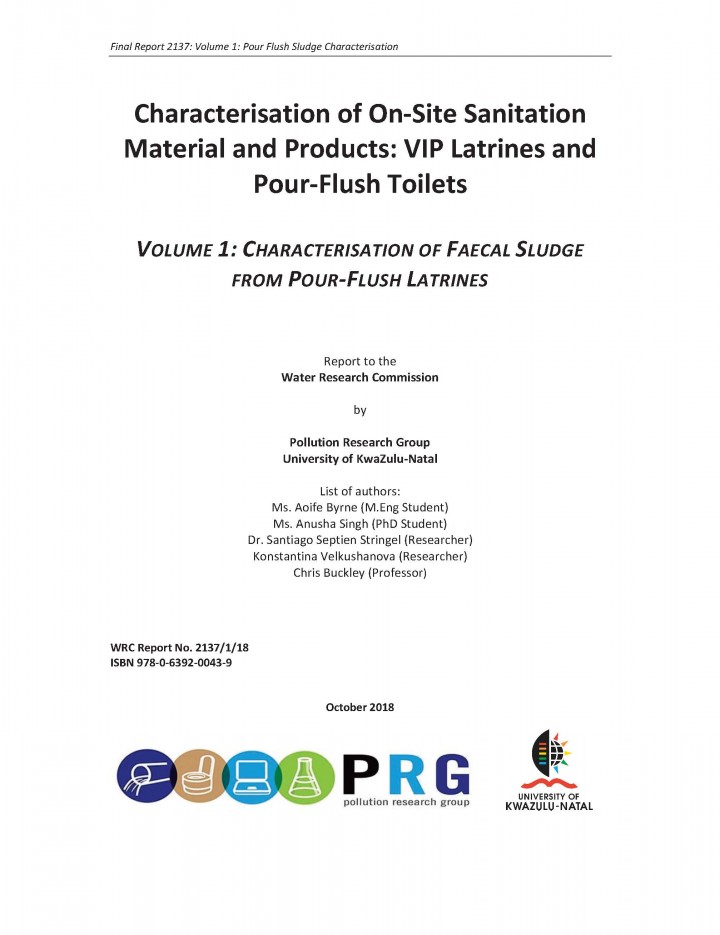Final report WRC project K5/2137: Characterisation of On-Site Sanitation Material and Products: VIP Latrines and Pour-Flush Toilets (Volume 1 and 2 available)
Byrne, A., Mirara, S. W., Singh, A., Septien, S., Velkushanova, K., Buckley, C. A. (2018)

Published in: 2018
Pages: 119
Publisher:
Water Research Comission
Author:
Byrne, A., Mirara, S. W., Singh, A., Septien, S., Velkushanova, K., Buckley, C. A.
Uploaded by:
Santiago Septien Stringel
Partner profile:
University of KwaZulu-Natal
2844 Views
53 Downloads
Location of library entry
This report from a research project funded by the Water Research Commission is divided into 2 volumes.
Volume 1:
In South Africa, the Pour-Flush system is viewed as an upgrade from the Ventilated Improved Pit latrine (VIP), which is the standard for basic sanitation in the country. PID successfully ran a pilot scheme involving the installation of approximately 25 Pour-Flush latrines in the greater Edendale area (Slangspruit, France and Azalea) outside of Pietermaritzburg in the province of KwaZulu-Natal, South Africa. The Pour-Flush systems installed in this area by PID were used for the basis of this research project. Sludge was sampled from selected pits repeatedly over a period of 11-months. The sludge was analysed chemically, physically and biologically to provide a base understanding of the sludge characteristics and possible mechanisms occurring in the pit. The filling rates of the pits were also monitored, as this is important information for planning future pit-emptying schemes and pit design.
Volume 2:
In 2009, the eThekwini Municipality (Durban, South Africa) set out to empty over 35 000 VIP latrines, which were already full, and dispose of the sludge in an environmentally safe way. This led to the development of the Latrine Dehydration and Pasteurisation (LaDePa) machine, manufactured by Particle Separation System (PSS), to dry and pasteurize faecal sludge using a combination of convective and infrared radiation heating. A laboratory-scale LaDePa was installed in the Pollution Research Group (PRG) laboratory, situated at the University of KwaZulu-Natal, Durban. Its objective was to understand better the drying process in the LaDePa process and optimize the operation of the full-scale machine. The research project focussed on two main aspects: (i) study of the drying behaviour of the faecal sludge in the LaDePa; (ii) determination of the biological, chemical and physical characteristics of the dried sludge in order to evaluate its reuse in agriculture or as a biofuel.
Bibliographic information
Byrne, A., Mirara, S. W., Singh, A., Septien, S., Velkushanova, K., Buckley, C. A. (2018). Final report WRC project K5/2137: Characterisation of On-Site Sanitation Material and Products: VIP Latrines and Pour-Flush Toilets (Volume 1 and 2 available). Water Research Comission
Filter tags
Educators Energy: fuel (liquid or solid) English Faecal sludge treatment processes Faeces or faecal sludge Fertiliser Fundamental research and engineering Guidelines and manuals Politicians and local decision makers Practitioners Sub-Saharan Africa














